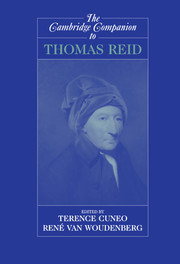Book contents
- Frontmatter
- Introduction
- 1 Reid in Context
- 2 Thomas Reid and the Culture of Science
- 3 Reid on Common Sense
- 4 Reid’s Theory of Perception
- 5 Reid’s Reply to the Skeptic
- 6 Nativism and the Nature of Thought in Reid’s Account of Our Knowledge of the External World
- 7 Reid and the Social Operations of Mind
- 8 Reid on Memory and the Identity of Persons
- 9 Thomas Reid’s Theory of Freedom and Responsibility
- 10 Reid’s Moral Philosophy
- 11 Reid’s Philosophy of Art
- 12 Reid’s Philosophy of Religion
- 13 Reid’s Influence in Britain, Germany, France, and America
- Bibliography
- Index
8 - Reid on Memory and the Identity of Persons
Published online by Cambridge University Press: 28 May 2006
- Frontmatter
- Introduction
- 1 Reid in Context
- 2 Thomas Reid and the Culture of Science
- 3 Reid on Common Sense
- 4 Reid’s Theory of Perception
- 5 Reid’s Reply to the Skeptic
- 6 Nativism and the Nature of Thought in Reid’s Account of Our Knowledge of the External World
- 7 Reid and the Social Operations of Mind
- 8 Reid on Memory and the Identity of Persons
- 9 Thomas Reid’s Theory of Freedom and Responsibility
- 10 Reid’s Moral Philosophy
- 11 Reid’s Philosophy of Art
- 12 Reid’s Philosophy of Religion
- 13 Reid’s Influence in Britain, Germany, France, and America
- Bibliography
- Index
Summary
This essay is a discussion of Reid's views on memory and the identity of persons through time. These topics are closely related, although there has been, and still is, a serious controversy about the exact nature of the relation. John Locke, on the one hand, made the case for what has come to be called the “Memory Theory of Personal Identity,” according to which the identity of persons through time is constituted by the memory that a person has of his or her past actions, experiences, and so forth. Thomas Reid, on the other hand, thought this was absurd, and argued for the thesis that the relation between memory and identity is simply of an evidential nature: Memory gives a person evidence that he or she is the same person as the person who did, or experienced some thing at some previous time.
The first section is a discussion of Reid’s views regarding memory as a source of knowledge, while the second considers his views on personal identity through time. In both sections, I will pay special attention to two features of Reid’s thought. The first feature is that there are, as Reid says, things that are “obvious and certain” with respect to memory and personal identity. Unlike Descartes, Reid doesn’t start by methodically doubting everything that seems obvious and certain. Rather, he endorses the principle that what seems obvious and certain is innocent until proven guilty. That is, what seems obvious and certain may legitimately be accepted as a starting point for philosophical reflection until it is shown that such acceptance is irrational, unjustified, or unwarranted. This endorsement is at least part of what makes Reid a common sense philosopher.
- Type
- Chapter
- Information
- The Cambridge Companion to Thomas Reid , pp. 204 - 221Publisher: Cambridge University PressPrint publication year: 2004
- 3
- Cited by

